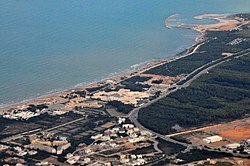Gammarth
Gammarth | |
|---|---|
Town | |
 | |
 Aerial view of the coastline | |
| Coordinates: - 25000) 36°54′35″N 10°17′12″E / 36.90972°N 10.28667°E | |
| Country | |
| Governorate | Tunis Governorate |
| Population (2023) | |
• Total | 15,000 - 25,000 |
| Time zone | UTC+1 (CET) |
Gammarth (Tunisian Arabic: ڨمرت ⓘ) is a town on the Mediterranean Sea in the Tunis Governorate of Tunisia, located some 15 to 20 kilometres north of Tunis, adjacent to La Marsa. It is an upmarket seaside resort, known for its expensive hotels and shops. In the marina bay area, there's a well served pleasance port with a naval shipyard, once privately owned and, as 2023, managed by the public port authority. Gammarth began as a small fishing village but following independence from France it blossomed into a resort from the 1950s. Tourism now provides the backbone to the local economy.[1] Gammarth has many five-star hotels and restaurants and also contains many lavish white villas and coves[clarification needed] in the vicinity. Notable villas include Abou Nawas Gammarth and Les Dunes.[2]
Excavations at Gammarth Hill have revealed some catacombs and Talmudic inscriptions.[3][4] These ancient burial chambers are believed to date to Roman times in the 2nd century when nearby Carthage was a thriving Roman city.
Gammarth also contains a notable cinema complex.[5]
Gallery
[edit]-
View from a hotel bar in Gammarth. Overlooking the Gammarth bay.
See also
[edit]References
[edit]- ^ Tunisia. Eyewitness Guides. 2008. p. 94.
- ^ Ham, Anthony; Hole, Abigail (2004). Tunisia. Lonely Planet. p. 92. ISBN 978-1-74104-189-7.
- ^ Stern, Karen B. (2008). Inscribing devotion and death: archaeological evidence for Jewish populations of North Africa. Volume 161 of Religions in the Graeco-Roman world, BRILL. p. 297. ISBN 978-90-04-16370-6.
- ^ Goodenough, Erwin Ramsdell (1968). Jewish Symbols in the Greco-Roman Period: Illustrations. Pantheon Books. ISBN 9780608186108.
- ^ Pommier, Pierre (1974). Cinéma et développement en Afrique noire francophone, Volume 3. Bibliothèque, Bordeaux Université, Pedone. p. 152. ISBN 9782233000019.






